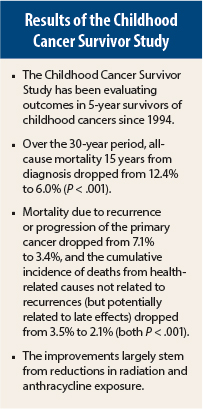Survivors of childhood cancers can expect longer lives than their peers of 30 years ago. Improvements in the care of children with cancer have reduced the long-term mortality rate, according to an analysis of 34,000 participants in the Childhood Cancer Survivor Study.1
Cumulative all-cause late mortality at 15 years dropped from 10.7% in the 1970s to 7.9% in the 1980s and to 5.8% in the 1990s, according to Gregory T. Armstrong, MD, a pediatric oncologist at St. Jude Children’s Research Hospital, Memphis, who shared the good news at the 2015 ASCO Annual Meeting Plenary Session.
“The improvement in the cure rate for childhood cancers is one of the success stories of modern medicine; however, these individuals are still at risk for late effects and mortality. The punch line of this story is that deaths due to late effects and other health-related causes have dropped,” Dr. Armstrong said at a press briefing during the Annual Meeting.
“Survivors in more recent eras have a significant reduction in late mortality attributable to fewer deaths from treatment-related causes, including subsequent malignancies and cardiac deaths,” he noted. “The strategy of reducing the intensity of therapy to lower the occurrence of late effects—along with the promotion of early detection and improved treatment of late effects—has now translated to extend the life span of survivors.”
Study Details
The federally funded Childhood Cancer Survivor Study evaluated long-term health outcomes in 5-year survivors of childhood cancer (leukemia, lymphoma, central nervous system malignancies, Wilms tumor, neuroblastoma, as well as soft-tissue and bone sarcomas). Subjects from 31 participating centers were diagnosed between 1970 and 1999 and followed for an average of 21 years after diagnosis. During the study period, 12% of patients died, and 41% of these deaths were from causes other than their cancer, including other health-related conditions as well as late effects of cancer therapy.
Some of the details presented by Dr. Armstrong at the Annual Meeting follow:
- Over the 30-year period, all-cause mortality 15 years from diagnosis dropped from 10.7% to 5.8% (P < .001).
- Mortality due to recurrence or progression of the primary cancer dropped from 7.1% to 3.4% (P < .001).
- Late mortality due to specific childhood cancers significantly decreased. This included a reduction from 2.8% to 1.9% (P < .001) for acute lymphoblastic leukemia (ALL); from 4.2% to 2.1% for Hodgkin lymphoma (P = .02); and from 2.2% to 0.4% for Wilms tumor (P < .001).
- The cumulative incidence of deaths from health-related causes not related to recurrences (but potentially related to late effects) dropped from 3.5% to 2.1% (P < .001).
- The incidence of deaths from subsequent neoplasms dropped from 1.8% to 1.0% (P < .001); cardiac-related deaths dropped from 0.5% to 0.1% (P = .001); and lung-related deaths dropped from 0.5% to 0.1% (P = .4).
Improvements From Treatment Modifications
These results have been driven by treatment refinements in the clinic, especially a reduction in the intensity of treatment for patients with favorable prognoses. Risk stratification, reserving the most intensive regimens for the highest risk patients, has included the elimination of cranial radiotherapy in many patients with ALL; response-based therapy—reduced dose or no radiation at all—for many patients with Hodgkin lymphoma; and reduced radiotherapy dose/volume and reduced anthracycline exposure in the treatment of localized Wilms tumor, he noted.
For example, cranial radiotherapy was delivered to 85% of pediatric patients with ALL in the 1970s, but it is given to 19% or fewer today. In the 1970s, 78% of patients with Wilms tumor received abdominal radiotherapy, compared with 43% today. Similar trends are seen for anthracycline exposure.
“Additionally, there have been improvements in screening and early detection of late effects, treatment of late effects, and supportive care,” Dr. Armstrong noted. ■
Disclosure: Dr. Armstrong reported no potential conflicts of interest.
Reference
1. Armstrong GT, Yasui Y, Chen Y, et al: Reduction in late mortality among 5-year survivors of childhood cancer: A report from the Childhood Cancer Survivor Study. 2015 ASCO Annual Meeting. Abstract LBA2. Presented May 31, 2015.



